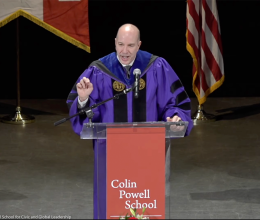
It's important for your elected officials to hear from you and your community, especially if there is an issue they need to address. Public comment periods are great avenues to get your point across.
After all, lawmakers are elected to represent you and your best interests! If they don't hear from you, they don't know how to best support you.
Here are some points to keep in mind when advocating for yourself and your community during a public comment period.
Why is speaking during a meeting's public comment period an effective advocacy tactic?
- It’s an opportunity to speak directly to elected officials about your concerns. You can share your personal story, bring up issues in your community, provide a brief background of your issue and ask questions of your elected official in front of a large crowd.
- You can recruit or join forces with others on your advocacy efforts. At public meetings, there likely will be others who care enough about issues facing the community who also want to speak. This is a great opportunity to meet other activists in your area.
Tips before attending:
- Find out what’s on the agenda and when you can speak. For public meetings, you can likely find the agenda online and see when public comment is allowed. If you can’t, call the office organizing the meeting and ask for a copy. You should also find out if there will be time for members of the public to speak, and if so, what you have to do to sign up to offer public comment.
- Be sure to prepare your statement. Focus on your elected officials record or statements they’ve made regarding the issue. If you have a personal connection to the issue, be sure to briefly share your personal story. Write down your questions so you are prepared.
- Be aware of time limits. Many meetings may have a time limit for each comment. If this is the case, practice your comment to ensure you are concise and within the time limit.
- Be visible. This could mean bringing signs, wearing the same color or wearing buttons — anything that makes it clear who in the crowd is there for the same reason. Make sure to check with the organization hosting to see if there are restrictions on signs.
- Stay on message. If you’ve recruited others to join your efforts, make sure to distribute talking points to all the activists at the meeting so that everyone's comments are concise and factually accurate. Remember that you aren’t speaking on behalf of the ACLU, but you are representing yourself, your community and our cause.
- Be courteous, yet direct. Conduct yourself in a way that is consistent with the seriousness of civil liberty issues. If your elected officials have said or done something outrageous or offensive, speak truth to power and let them know you disagree.
Find more resource and tips to bolster your advocacy efforts on our advocacy resource page.
P.S. You can download a printable PDF to take this resource with you or screenshot this page.







